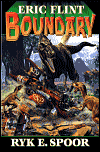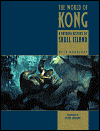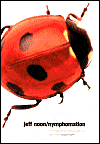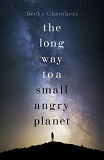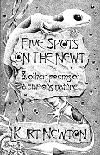
Five Spots on the Newt, by Kurt Newton
Book Review by Phillip A. Ellis
Have you read this book?
Poetry is not always appreciated, especially when it blurs the lines of the fantastic and horrific. Such a work as this can fail to find a fitting audience, with its six pieces that display a mastery of diction and genre. But Kurt Newton has here assembled a handful of interesting and satisfying poems. Each displays a similarity of technique, even as they display the diversity of his imagination. For the most part they hover between narrative and lyric, setting up situations and exploring their emotional resonances more fully. Each then creates, in this way, then, a self-contained world, with its own rules, natures, and surprises, from which all we need to react, emotionally and viscerally, is self-contained and self-evident.
To start with, "Bloom" looks at themes of transformation and gender, and its exploration of the human and inhuman create a satisfying piece. It sets up its situation, and the drive towards the conclusion is as unsettling as it is inevitable. "The Snowman", in contrast, creates an unsettling vignette of consumption and provision. Its concision helps create an unnerving sense of dread. "The Garden" returns in part to the early imagery of "Bloom". Like that piece, it involves plant life, but then again, like "The Snowman," consumption becomes an eventual theme.
Next, the title poem, "Five Spots on the Newt", forms the centrepiece of this slim volume. It is a narrative, following the discovery of a snow-white newt in a hollow rock, by two children. The newt's presence, however, is not benign: the results of its discovery slowly break the family, and Kurt here has chronicled the family's disintegration in a flexible and effective poetic voice. This poem alone is a worthy reason to buy this chapbook, and it should be more widely known and savoured.
"The Old Stone Mill" follows on, and in doing so appears slight, compared to the preceding poem. However, appearances are deceiving. Read on its own, it creates an unsettling picture of loss, and its ending is as unnerving as it is effective. Finally, "The Street Urchin" concludes this volume, exploring in its short compass transmigration and identity. It is a short, but satisfying piece, a neat coda to a uniformly excellent volume.
Overall, if you appreciate poetry, then you should at least give Five Spots a look. Although in a sense an early volume, preceded only by his Psychoses, it is nonetheless a mature work, written with great assurance and facility. The lines of each poem are flexible, and the diction is both expressive and apt for the purposes at hand. Although to scare may be a slim purpose in poetry, Kurt's aim here is more to unnerve, to create a set of horrors whose aim is not to terrify, but to alter our perception of what is reality, and what is normal. That he does this with a facility of invention that, basically, bodes well for his future as a speculative poet, and makes this volume well worth buying.
Editor's Note -- this volume is available through Shocklines, Ziesing Books, or through the author's website (via paypal).
To start with, "Bloom" looks at themes of transformation and gender, and its exploration of the human and inhuman create a satisfying piece. It sets up its situation, and the drive towards the conclusion is as unsettling as it is inevitable. "The Snowman", in contrast, creates an unsettling vignette of consumption and provision. Its concision helps create an unnerving sense of dread. "The Garden" returns in part to the early imagery of "Bloom". Like that piece, it involves plant life, but then again, like "The Snowman," consumption becomes an eventual theme.
Next, the title poem, "Five Spots on the Newt", forms the centrepiece of this slim volume. It is a narrative, following the discovery of a snow-white newt in a hollow rock, by two children. The newt's presence, however, is not benign: the results of its discovery slowly break the family, and Kurt here has chronicled the family's disintegration in a flexible and effective poetic voice. This poem alone is a worthy reason to buy this chapbook, and it should be more widely known and savoured.
"The Old Stone Mill" follows on, and in doing so appears slight, compared to the preceding poem. However, appearances are deceiving. Read on its own, it creates an unsettling picture of loss, and its ending is as unnerving as it is effective. Finally, "The Street Urchin" concludes this volume, exploring in its short compass transmigration and identity. It is a short, but satisfying piece, a neat coda to a uniformly excellent volume.
Overall, if you appreciate poetry, then you should at least give Five Spots a look. Although in a sense an early volume, preceded only by his Psychoses, it is nonetheless a mature work, written with great assurance and facility. The lines of each poem are flexible, and the diction is both expressive and apt for the purposes at hand. Although to scare may be a slim purpose in poetry, Kurt's aim here is more to unnerve, to create a set of horrors whose aim is not to terrify, but to alter our perception of what is reality, and what is normal. That he does this with a facility of invention that, basically, bodes well for his future as a speculative poet, and makes this volume well worth buying.
Editor's Note -- this volume is available through Shocklines, Ziesing Books, or through the author's website (via paypal).
|
Click here to buy Five Spots on the Newt, by Kurt Newton on Amazon
|
Five Spots on the Newt, by Kurt Newton on Amazon

| More Books You Might Like |
Comment on Five Spots on the Newt, by Kurt Newton
| Comments on Five Spots on the Newt, by Kurt Newton |
| There are no comments on this book. |

